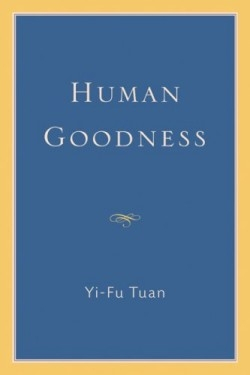Human Goodness
Yi-Fu Tuan is known for his ability to take on big issues and make them accessible, a skill which has served him well in his career as a professor and author of more than two dozen books on philosophical and metaphysical subjects. Tuan is the J. K. Wright and Vilas Professor Emeritus of Geography at the University of Wisconsin-Madison, and has been honored with the Cullum Medal of the American Geographical Society, the Charles Homer Haskins Lectureship of the American Council of Learned Societies and the Laureat d’Honneur of the International Geographical Union.
Although he considers himself a “pessimist,” believing as he does that “true goodness—true moral excellence” is rare and that any “sensitive individual is right to be appalled by not only the evil but also the drab wastefulness in so much of human life,” Tuan has chosen to focus attention on people whose lives have been of great value, and who were considered, both by the evaluation of their peers and by time, to have been “good” people. Though the individuals whose lives are examined in this work are not without their faults—gifted and complex people like Confucius, Socrates, Mozart, Keats, Albert Schweitzer, and Simone Weil—they have all made lasting contributions to world culture, and their lives shine like stars against the backdrop of human misery.
In spite of differences in time, place, profession, and culture, Tuan asserts that all “good” people have characteristics in common and that these characteristics can be identified without resorting to mysticism. Instead they are recognized in practical descriptions of the behaviors, actions, and contributions made to the welfare of the whole. Some of the characteristics under consideration include: the ability to go against a “customary good” for a higher good; selflessness and a childlike quality that manifests as curiosity, enthusiasm, and disregard for the opinions of others; physical vigor; strong individualism; openness; humility, gratitude, and the ability to give credit to those who paved the way for one’s success; an inclusive outlook on humanity; a strong “sense of place”; civility and the ability to respond without prejudice; generosity; devotion to truth; and fearlessness, even in the face of death.
In defining the characteristics of those called “good,” Yi-Fu Tuan has offered the opposite of the negative focus presented by the media and the social sciences. Human Goodness is an important and encouraging contribution to the literature on what it means to be truly human.
Reviewed by
Kristine Morris
Disclosure: This article is not an endorsement, but a review. The publisher of this book provided free copies of the book to have their book reviewed by a professional reviewer. No fee was paid by the publisher for this review. Foreword Reviews only recommends books that we love. Foreword Magazine, Inc. is disclosing this in accordance with the Federal Trade Commission’s 16 CFR, Part 255.

